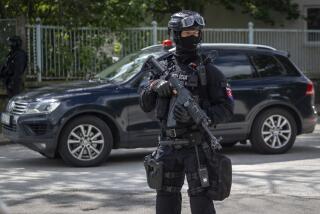Czechs Try Ex-Premier for Communist-Era Crime
- Share via
PRAGUE, Czech Republic — Former Czechoslovak Prime Minister Lubomir Strougal went on trial Monday in a case that reflects a recently toughened stance against Communist-era crimes.
Strougal, 77, prime minister from 1970 to 1988, pleaded not guilty to charges that, as interior minister in 1965, he thwarted the prosecution of seven secret police agents for three murders committed in the late 1940s.
“As an interior minister, I always followed the law and everything I did was legally correct,” Strougal told the court Monday. Wearing a dark suit, deep blue shirt and striped tie, he was accompanied by his wife and daughter.
Facing obstruction of justice charges, Strougal is accused of ordering his staff to drop an investigation into the deaths of three men who had been tortured in a bid to extract confessions. One died during interrogation. When the secret police realized that the other two men were innocent, the police shot and killed them in a staged escape attempt to prevent them from speaking about the torture, investigators say now.
Strougal said Monday that he had been of the opinion that “policemen should not investigate policemen.” He also said that in 1965, he proposed that the case be transferred away from police investigators and given to the general prosecutor’s office. Strougal faces up to 10 years in prison if convicted.
Prosecution of Communist-era officials has been difficult in the Czech Republic because the justice system operates on the principle that Communist laws were valid and, thus, human rights violations can be treated as crimes only if laws that were in force at the time were broken. Strougal is charged with blocking efforts in the 1960s to redress some of the worst offenses of the early Communist period.
In recent months, there has been growing coordination in the Czech Republic between prosecutors and the Office for the Documentation and Investigation of the Crimes of Communism, which has the power to look into cases of abuses before the 1989 collapse of communism in the nation. Several important cases have recently gone to trial or are pending.
“After 12 years of relative peace, suddenly former prominent Communists have reason to fear the courts,” Mlada Fronta Dnes, a leading Czech newspaper, said Monday. “It looks as if justice woke up.”
President Vaclav Havel, a former dissident, has praised the new momentum in prosecutions of Communist-era officials, calling it “of great importance.”
A trial began early this month of former Communist-era Interior Minister Jaromir Obzina, 72, and four other former top officials on charges of abuse of power for a campaign against dissidents in the late 1970s and early 1980s. Called “Operation Clearance,” the brutal harassment was aimed at forcing signers of the Charter 77 human rights manifesto to emigrate.
Former prosecutor Karel Vas, 85, was sentenced in June to seven years’ imprisonment for his role in a political trial that led to the 1949 execution by hanging of World War I and World War II hero Heliodor Pika. Vas is free on appeal.
The trial of former secret police interrogator Alois Grebenicek, repeatedly postponed for medical reasons, is to proceed next month, if necessary in a hospital.
Alojz Lorenc, the last head of Czechoslovakia’s secret service, received a 15-month suspended sentence in Slovakia earlier this month for alleged mistreatment of dissidents in the late 1980s. Both Lorenc and the prosecution appealed.
Czechoslovakia split into two countries, the Czech Republic and Slovakia, on Jan. 1, 1993. That saved Lorenc, a Slovak citizen, from serving a four-year sentence after a Czechoslovak court convicted him in 1992 of breaching the rights of 294 citizens.
Former Czechoslovak Communist officials who have faced trial for alleged crimes have rarely, if ever, expressed remorse. Vas recently published a book portraying himself as a victim, titled “My Persecution,” and even arranged an autograph session.
The Office for the Documentation and Investigation of the Crimes of Communism is also pressing for prosecution of two former top Communist Party officials, Milos Jakes, 79, and Jozef Lenart, 78, for alleged treason during the 1968 Soviet-led invasion of Czechoslovakia, which crushed the “Prague Spring” reform movement.
Jakes, who later rose to head the Communist Party, and Lenart, who became prime minister, were initially arrested in 1990. Both were released within 48 hours. The investigative office made similar requests for their prosecution in 1997 and 2000, but the cases were sent back to the office for further research and documentation.
The highest-ranking former Czechoslovak Communist official to be found guilty and serve prison time was Miroslav Stepan, convicted in 1990 of abuse of power for ordering the use of water cannons and tear gas against protesters in Prague in 1988, when he headed the Communist Party of the then-Czechoslovak, and now Czech, capital. He was sentenced to four years’ imprisonment but was released early for good behavior.
*
Times staff writer Holley reported from Warsaw and special correspondent Drapalova from Prague.
More to Read
Sign up for Essential California
The most important California stories and recommendations in your inbox every morning.
You may occasionally receive promotional content from the Los Angeles Times.













